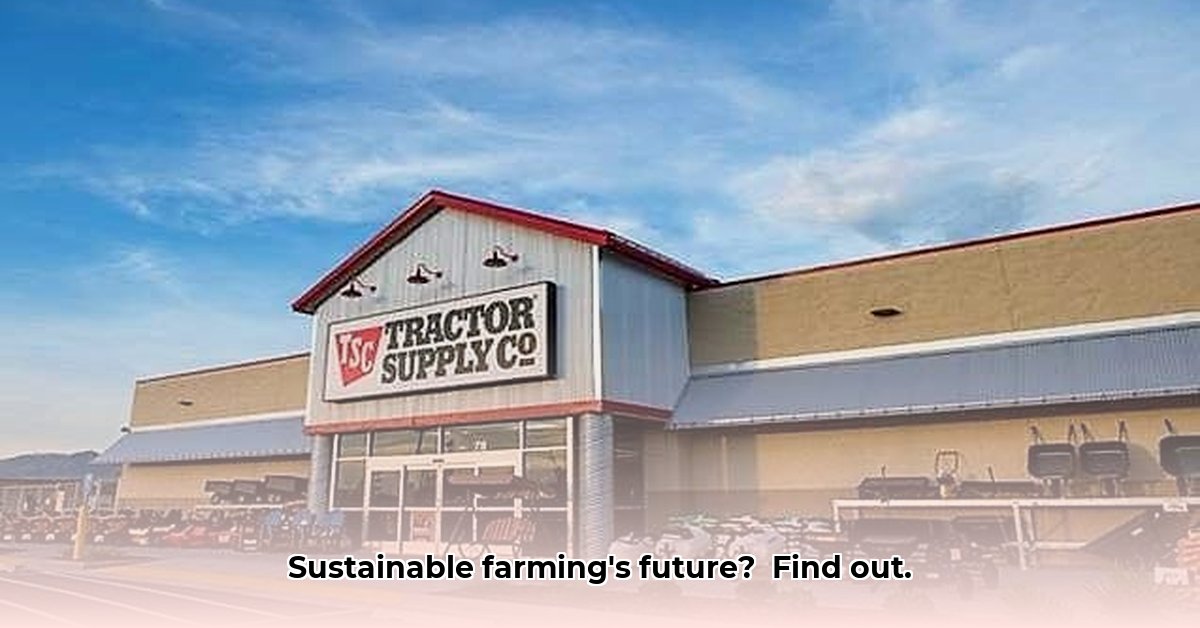
Kent Tractor Supply and Sustainable Agriculture: A Path to Growth
Kent Tractor Supply (KTS) faces a significant opportunity within the burgeoning market for sustainably produced food. This article analyzes KTS's current contribution to sustainable agriculture, identifies key knowledge gaps, and proposes actionable strategies for future growth. The increasing consumer demand for sustainably sourced food presents a substantial market potential for KTS, yet realizing this potential requires a strategic and data-driven approach.
Assessing KTS's Current Contribution to Sustainable Agriculture
KTS offers some products supportive of sustainable farming practices, including certain organic seeds and water-efficient irrigation equipment. However, a comprehensive analysis is hampered by a lack of publicly available data on sales figures and market share within this specific sector. How significant is KTS's commitment to sustainable agriculture in its overall business strategy? Are these eco-friendly offerings a substantial portion of their sales, or merely a marginal addition to their product catalog? This lack of transparency hinders a complete evaluation.
Furthermore, the transparency of KTS's supply chain regarding sustainable practices remains unclear. Are ethical sourcing and sustainable manufacturing processes prioritized? Are there independent certifications to validate KTS's sustainability claims? These are critical questions requiring immediate clarification. Without this crucial information, accurate assessments of KTS's overall environmental impact remain impossible.
Does the current product offering adequately address the diverse needs of farmers employing sustainable agricultural practices? What percentage of KTS’s total sales result from sustainable agriculture products? Data regarding KTS's environmental footprint – carbon emissions, water usage, and waste generation – remains unavailable. This lack of transparency and data critically limits our ability to fully assess KTS's contribution to, or impact on, environmental sustainability.
Building a Brighter, Greener Future: Actionable Strategies
To effectively navigate the path toward sustainable agriculture, a comprehensive strategy involving all stakeholders – KTS, farmers, consumers, and government/NGOs – is crucial.
1. Actionable Steps for Kent Tractor Supply:
- Comprehensive Sustainability Audit: Conduct a thorough sustainability audit to quantify its environmental impact and analyze its supply chain, measuring carbon emissions, water consumption, waste generation, and evaluating sourcing practices.
- Transparent Sustainability Reporting: Establish a public sustainability reporting framework, releasing regular reports on environmental performance and sustainability initiatives to build trust and accountability.
- Measurable Sustainability Targets: Set ambitious, yet achievable, targets for reducing emissions, conserving water, minimizing waste, and increasing the use of sustainable materials, with clear timelines and metrics for success.
- Strategic Partnerships: Collaborate with reputable sustainable agriculture organizations to leverage their expertise, access resources, and potentially develop new, sustainable products.
- Investment in Innovation: Invest in research and development to explore and promote innovative technologies enhancing farming sustainability, such as precision agriculture techniques and sustainable product development.
2. Actionable Steps for Farmers:
- Accessible Farmer Education: KTS should offer hands-on workshops and training programs focused on practical, easily implementable sustainable agricultural practices.
- Financial Assistance for Sustainable Farming: Provide financial support, like low-interest loans or grants, to incentivize farmers to adopt sustainable methods.
- Cooperative Development: Encourage the formation of farmer cooperatives to facilitate knowledge sharing, bulk purchasing, and collective marketing of sustainable products.
3. Actionable Steps for Consumers:
- Clear and Understandable Product Labeling: Implement a clear labeling system for sustainable products, simplifying consumer identification of eco-friendly options.
- Effective Marketing of Sustainability: Highlight the environmental benefits of sustainable agricultural products through targeted marketing campaigns.
- Incentivizing Sustainable Purchases: Consider loyalty programs or discounts to incentivize the purchase of sustainable products.
4. Actionable Steps for Government/NGOs:
- Collaborative Partnerships: Collaborate with government agencies and NGOs to support farmer education programs and raise awareness of sustainable agriculture practices.
- Advocacy for Supportive Policies: Advocate for policies supporting sustainable agriculture, such as tax incentives, subsidies for sustainable practices, and stricter regulations on environmentally harmful practices.
- Strategic Stakeholder Partnerships: Encourage and facilitate partnerships between KTS and other sustainable agriculture stakeholders.
Conclusion: Data-Driven Decisions for a Sustainable Future
KTS's success in sustainable agriculture depends on its commitment to transparency and data-driven decision-making. Without quantifiable data illustrating its current environmental footprint and practices, meaningful progress will be considerably more difficult. By embracing transparency, establishing clear, measurable goals, and implementing proactive steps, KTS can position itself as a responsible business and a key player in the growing sustainable agriculture market. The potential for growth is considerable; decisive action is essential.